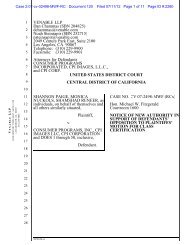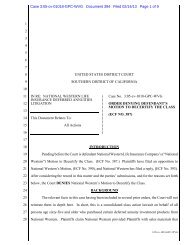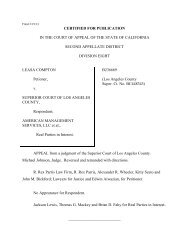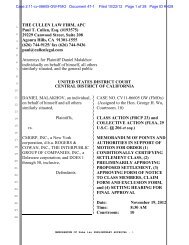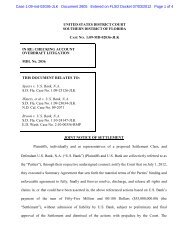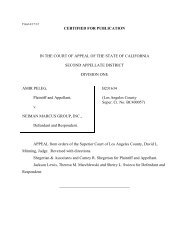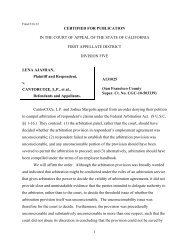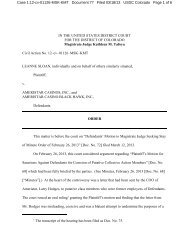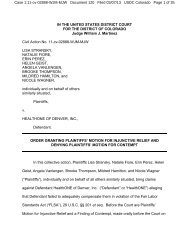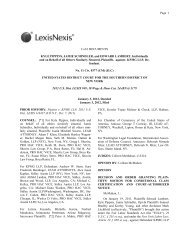order denying motion to compel arbitration - Impact Litigation Journal
order denying motion to compel arbitration - Impact Litigation Journal
order denying motion to compel arbitration - Impact Litigation Journal
You also want an ePaper? Increase the reach of your titles
YUMPU automatically turns print PDFs into web optimized ePapers that Google loves.
Case3:12-cv-05109-SI Document68 Filed04/03/13 Page11 of 13<br />
1<br />
2<br />
3<br />
4<br />
5<br />
Driscoll Strawberry Associates, Inc., 603 F.2d 748, 755 (9th Cir. 1979). Therefore, plaintiffs argue, this<br />
provision is unconscionable because it does not afford them their rights under the law.<br />
However, the Agreement also states that “[t]he arbitra<strong>to</strong>rs shall have no authority <strong>to</strong> make<br />
material errors of law” and “shall have no authority <strong>to</strong> make any award that could not have been made<br />
by a court of law.” In reading these provisions <strong>to</strong>gether, the Court interprets the Agreement <strong>to</strong> require<br />
United States District Court<br />
For the Northern District of California<br />
6<br />
7<br />
8<br />
9<br />
10<br />
11<br />
12<br />
13<br />
14<br />
15<br />
16<br />
17<br />
18<br />
19<br />
20<br />
21<br />
22<br />
23<br />
24<br />
25<br />
26<br />
27<br />
the arbitra<strong>to</strong>r <strong>to</strong> interpret the contract under the law, including the FLSA. See AT & T Techs., Inc. v.<br />
Commc’ns Workers of Am., 475 U.S. 643, 650 (1986) (holding that a court must choose amongst<br />
reasonable interpretations the one that allows for <strong>arbitration</strong>). Therefore, under the Agreement, the<br />
arbitra<strong>to</strong>r would not and could not be bound by the contractual label of “independent contrac<strong>to</strong>r,” and<br />
would be required <strong>to</strong> apply the economic reality test.<br />
Thus, the Court finds that this provision of the Agreement is not unconscionable.<br />
8. Forum in San Francisco<br />
Finally, plaintiffs argue that the Agreement’s requirement that “[t]he <strong>arbitration</strong> shall be<br />
conducted in San Francisco, California” is unconscionable. They point <strong>to</strong> the fact that MFL Consultants<br />
work for MHN across the country and throughout the world, and therefore travel <strong>to</strong> San Francisco is<br />
unduly oppressive. Under California law, a forum selection clause is analyzed by taking in<strong>to</strong> account<br />
the “respective circumstances of the parties.” Bolter v. Superior Court, 87 Cal. App. 4th 900, 908<br />
(2001) (finding the forum selection provision “unduly oppressive” where small “Mom and Pop”<br />
franchisees located in California were required <strong>to</strong> travel <strong>to</strong> Utah <strong>to</strong> arbitrate their claims against an<br />
international carpet-cleaning franchisor); see also Nagrampa, 469 F.3d at 1288-90 (finding Bos<strong>to</strong>n<br />
forum unconscionable because it was so prohibitively expensive that the individual plaintiff was<br />
essentially unable <strong>to</strong> litigate her claim).<br />
Although plaintiffs are able <strong>to</strong> assert a <strong>compel</strong>ling hypothetical argument as <strong>to</strong> why this<br />
provision would be unconscionable <strong>to</strong> an MFL Consultant stationed in Germany (or in Djibouti, as was<br />
argued at the hearing), the facts here do not support this claim. After all, plaintiffs chose <strong>to</strong> file their<br />
28 11



